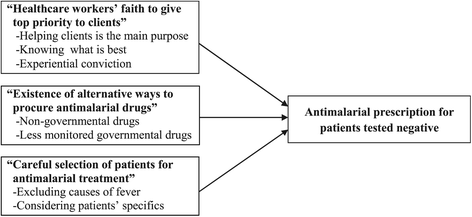Antimalarial drug prescribing by healthcare workers when malaria testing is negative: a qualitative study in Madagascar
- PMID: 29713235
- PMCID: PMC5913795
- DOI: 10.1186/s41182-018-0096-7
Antimalarial drug prescribing by healthcare workers when malaria testing is negative: a qualitative study in Madagascar
Abstract
Background: Despite the World Health Organization and the National Malaria Program of Madagascar recommending that antimalarial drugs only be prescribed for patients with positive results on malaria rapid diagnostic tests, healthcare workers continue to prescribe these drugs for cases with negative test results. We explored why and how primary healthcare workers in Madagascar continue to prescribe antimalarial drugs despite this guidance.
Methods: We purposively selected 14 medical doctors and 2 nurses from 11 primary health facilities (6 public, 5 private) in Toliara, Madagascar, and interviewed them regarding their antimalarial prescribing behaviors. Semi-structured interviews were conducted, focusing on why and how antimalarials were prescribed for clients with negative rapid diagnostic test results. Interviews were audio-recorded and transcribed verbatim, and the responses were manually coded until consistent themes emerged.
Results: The narrative of healthcare workers regarding their continued prescribing of antimalarials despite negative test results revealed the following: (1) they prescribe antimalarials without positive test results due to their faith to give top priority to clients including the ethical value of beneficence, hope to maintain clinician's independence, and belief in drug effectiveness; (2) they use antimalarials despite negative test results due to the availability of alternative ways to procure antimalarials; and (3) they carefully select cases to prescribe and determine specific antimalarials despite negative test results by considering the client's physical condition, preference, and economic status. Our results indicate that healthcare workers prioritized clinician autonomy to give the best care they believed for each client they received, which led to conflict with policy administrators that urged clinicians to follow the national policy and guidelines. Moreover, healthcare workers had access to multiple sources of antimalarial drugs, and there was a lack of consistency in the program provisions that allowed alternative routes for prescribing outside of official policy.
Conclusions: We have shown how a national malarial treatment policy was translated into practice in Madagascar and have highlighted the barriers that may prevent policy success. We must attend to each of these barriers if we are to promote optimal use of antimalarial drugs.
Keywords: Antimalarials; Drug prescriptions; Guideline adherence; Health personnel; Health policy; Madagascar; Qualitative research.
Conflict of interest statement
This study protocol was approved by the Regional Representative of the Ministry of Health in Toliara, Madagascar, and by the Ethical Committee of Tokyo Women’s Medical University, Japan (No.1874; No. 2967). Written informed consent was obtained from all participants.Our manuscript does not contain any personally identifiable information.The authors declare that they have no competing interests.
Figures
Similar articles
-
Adherence to malaria diagnosis and treatment guidelines among healthcare workers in Ogun State, Nigeria.BMC Public Health. 2016 Aug 19;16(1):828. doi: 10.1186/s12889-016-3495-x. BMC Public Health. 2016. PMID: 27538947 Free PMC article.
-
Why do health workers give anti-malarials to patients with negative rapid test results? A qualitative study at rural health facilities in western Uganda.Malar J. 2016 Jan 11;15:23. doi: 10.1186/s12936-015-1020-9. Malar J. 2016. PMID: 26754484 Free PMC article.
-
Practice of antimalarial prescription to patients with negative rapid test results and associated factors among health workers in Oyo State, Nigeria.Pan Afr Med J. 2018 Jul 26;30:229. doi: 10.11604/pamj.2018.30.229.13231. eCollection 2018. Pan Afr Med J. 2018. PMID: 30574247 Free PMC article.
-
Antimalarial drug policy in India: past, present & future.Indian J Med Res. 2014 Feb;139(2):205-15. Indian J Med Res. 2014. PMID: 24718394 Free PMC article. Review.
-
History and current status of Plasmodium falciparum antimalarial drug resistance in Madagascar.Scand J Infect Dis. 2010;42(1):22-32. doi: 10.3109/00365540903289670. Scand J Infect Dis. 2010. PMID: 19883158 Review.
Cited by
-
Management of uncomplicated malaria among children under five years at public and private sector facilities in Mali.BMC Public Health. 2020 Dec 9;20(1):1888. doi: 10.1186/s12889-020-09873-1. BMC Public Health. 2020. PMID: 33298011 Free PMC article.
-
Exploring Barriers and Facilitators of Adherence to Artemisinin-Based Combination Therapies for the Treatment of Uncomplicated Malaria in Children in Freetown, Sierra Leone.Healthcare (Basel). 2021 Sep 18;9(9):1233. doi: 10.3390/healthcare9091233. Healthcare (Basel). 2021. PMID: 34575007 Free PMC article.
-
Perceptions and drivers of healthcare provider and drug dispenser practices for the treatment of malaria in pregnancy in the context of multiple first-line therapies in western Kenya: a qualitative study.Malar J. 2023 Sep 14;22(1):274. doi: 10.1186/s12936-023-04698-w. Malar J. 2023. PMID: 37710229 Free PMC article.
-
Global estimation of anti-malarial drug effectiveness for the treatment of uncomplicated Plasmodium falciparum malaria 1991-2019.Malar J. 2020 Oct 20;19(1):374. doi: 10.1186/s12936-020-03446-8. Malar J. 2020. PMID: 33081784 Free PMC article.
-
Baseline malaria prevalence and care-seeking behaviours in rural Madagascar prior to a trial to expand malaria community case management to all ages.Malar J. 2021 Oct 26;20(1):422. doi: 10.1186/s12936-021-03956-z. Malar J. 2021. PMID: 34702255 Free PMC article.
References
-
- World Health Organization. Universal access to malaria diagnostic testing: an operational manual. Geneva: World Health Organization; 2011.
-
- World Health Organization. T3: Test. Treat. Track. Scaling up Diagnostic Testing, Treatment and Surveillance for Malaria. Geneva: World Health Organization; 2012.
-
- World Health Organization. World malaria report 2016. Geneva: World Health Organization; 2016.
-
- Bisoffi Z, Sirima BS, Angheben A, Lodesani C, Gobbi F, Tinto H, Van den Ende J. Rapid malaria diagnostic tests vs. clinical management of malaria in rural Burkina Faso: safety and effect on clinical decisions. A randomized trial. Tropical Med Int Health. 2009;14:491–498. doi: 10.1111/j.1365-3156.2009.02246.x. - DOI - PubMed
LinkOut - more resources
Full Text Sources
Other Literature Sources

